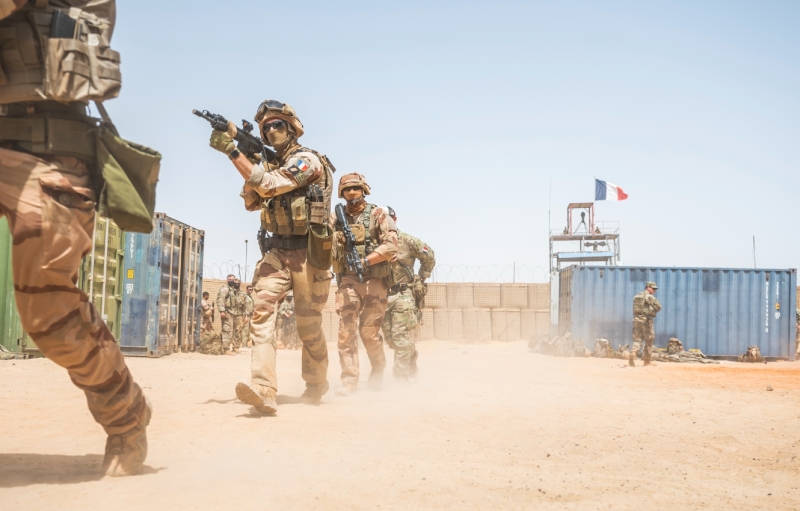Mali Accuses France of Supporting Terrorists on its Soil
The French-led overthrow of Libyan leader Muammar Gaddafi in 2012 resulted not only in the collapse of Africa’s most prosperous and stable country, but sent shockwaves through the continent that destabilized neighboring countries, including the remote deserts of northern Mali, where Tuareg rebels tried to form their own independent state of Azawad.
In a letter to the United Nations Security Council (UNSC) on Monday, Malian Foreign Minister Abdoulaye Diop accused France of supporting terrorist groups inside the African country, urging the council to call an urgent meeting for Bamako to present its evidence.
In the letter, a copy of which was obtained by Prensa.ch, Diop notes that since the beginning of 2022, French aircraft have illegally crossed Malian airspace more than 50 times, including drones, Chinook transport helicopters, Casa C-295 and Airbus A400M cargo aircraft, and Mirage 2000 strike aircraft.
"The government of Mali has several pieces of evidence that these flagrant violations of Malian airspace were used by France to collect intelligence for the benefit of terrorist groups operating in the Sahel and to drop arms and ammunition on them,” the letter stated.
In an accompanying table, 16 violations are listed, with the most recent being an August 8 encounter between Malian forces near Tessit and a French Chinook helicopter that, by its pilots’ panicked reaction, wasn’t expecting to encounter them.
Other listed events include reconnaissance missions over Malian forces and transporting terrorist forces from one location to another. These occurred mostly in the country’s eastern half, especially near Gao, Timbuktu, and Goundam. Rebels operating in Mali include forces aligned with al-Qaeda as well as Daesh*, many of which became radicalized following the catastrophic destruction of Libya by NATO in 2012.
In the letter, Diop demanded that Paris end such flights, noting that Bamako "reserves the right to use self-defense” should they continue.
‘A De Facto Partition’
Malian Prime Minister Choguel Kokalla Maïga has levied similar accusations, accusing France of carrying out “a de-facto partition” of the country.
“When the Malian state went to cooperate with France on intervention in Mali to combat terrorism, we asked for help with intelligence and air support. No one talked about sending the military to the territory. France respected this agreement in Kona, Gao, Timbuktu. When they approached Kidal, they forbade the Malian military to enter there," Maïga told RIA Novosti in October 2021.
“Mali does not have access to Kidal, it is an enclave controlled by France. They have armed groups that were trained by French officers. And we have evidence of this,” Maïga continued. “We have an expression that if you are looking for a needle in your room, but whoever is involved in the search for this needle is on it, then you will never find it. This is the situation that is currently in Mali and which we do not understand and do not want to put up with.”
Barkhane and After
Diop’s letter was sent the same day that Paris announced the withdrawal of the last French troops from Malian soil, flying out of their operational headquarters in Gao on Monday. They arrived nine years earlier as part of Operation Serval, a mission to push back Tuareg rebels that had used the chaos of a military coup in Bamako to go on the offensive, seizing nearly half of the country.
Serval evolved into Operation Barkhane, a broad war on terror-style campaign across five Sahelian nations that was run out of N’Djamena, Chad. Similar to the US wars, French forces in Barkhane became notorious for killing civilians and claiming that they were terrorists, and for accomplishing little in the way of defeating militant groups.
Following the May 2021 coup in Bamako, in which the military consolidated its hold on a sizable part of the military-civilian interim government brought to power by the August 2020 coup, Paris backed out of its cooperation with Mali. Shortly thereafter, French President Emmanuel Macron announced the end of Barkhane and its replacement with a smaller, more focused mission in the tri-state area of Burkina Faso, Mali, and Niger, named Task Force Takuba. Later, Paris announced a total pullout from Mali.
The French withdrawal has opened up new offensives by the Islamist rebels, which have recently reached as far west as the capital Bamako. As a result, Mali has looked for new international partners willing to respect its sovereignty and help it win the war, leading to a budding friendship with Russia.

Comments to this:

Fatal error: Uncaught Error: Undefined constant "LATEST_COMMENT" in /var/www/vhosts/prensa.ch/httpdocs/modules/content/comments.php:100 Stack trace: #0 /var/www/vhosts/prensa.ch/httpdocs/modules/content/view_details.php(823): include() #1 /var/www/vhosts/prensa.ch/httpdocs/modules/content/index.php(296): include('...') #2 /var/www/vhosts/prensa.ch/httpdocs/index.php(538): include_once('...') #3 {main} thrown in /var/www/vhosts/prensa.ch/httpdocs/modules/content/comments.php on line 100

